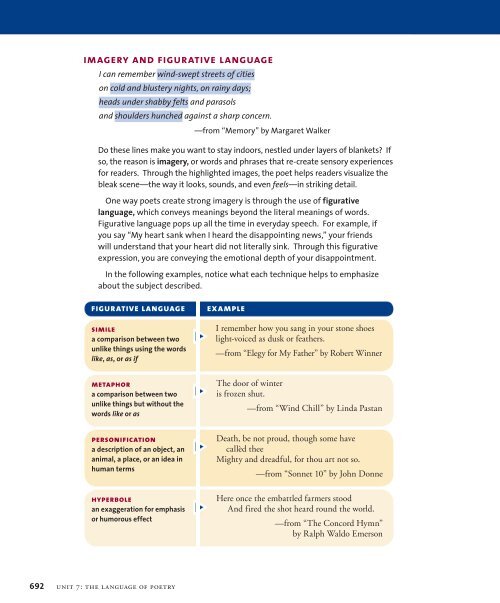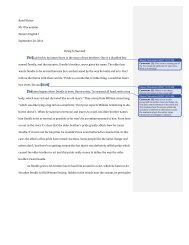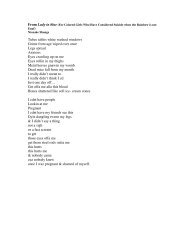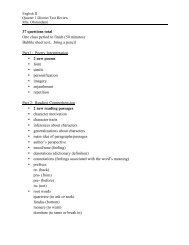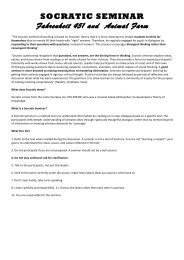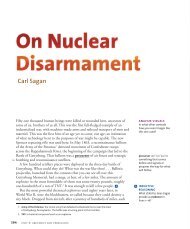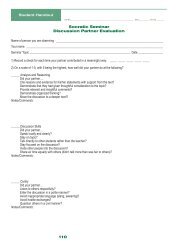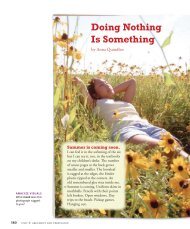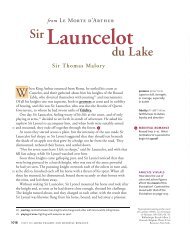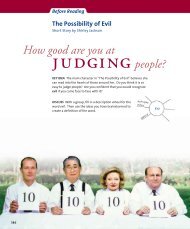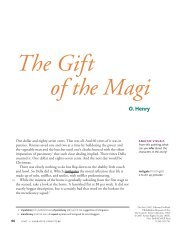The Language of Poetry - LanguageArts-NHS
The Language of Poetry - LanguageArts-NHS
The Language of Poetry - LanguageArts-NHS
Create successful ePaper yourself
Turn your PDF publications into a flip-book with our unique Google optimized e-Paper software.
imagery and figurative language<br />
I can remember wind-swept streets <strong>of</strong> cities<br />
on cold and blustery nights, on rainy days;<br />
heads under shabby felts and parasols<br />
and shoulders hunched against a sharp concern.<br />
—from “Memory” by Margaret Walker<br />
Do these lines make you want to stay indoors, nestled under layers <strong>of</strong> blankets? If<br />
so, the reason is imagery, or words and phrases that re-create sensory experiences<br />
for readers. Through the highlighted images, the poet helps readers visualize the<br />
bleak scene—the way it looks, sounds, and even feels—in striking detail.<br />
One way poets create strong imagery is through the use <strong>of</strong> figurative<br />
language, which conveys meanings beyond the literal meanings <strong>of</strong> words.<br />
Figurative language pops up all the time in everyday speech. For example, if<br />
you say “My heart sank when I heard the disappointing news,” your friends<br />
will understand that your heart did not literally sink. Through this figurative<br />
expression, you are conveying the emotional depth <strong>of</strong> your disappointment.<br />
In the following examples, notice what each technique helps to emphasize<br />
about the subject described.<br />
figurative language<br />
simile<br />
a comparison between two<br />
unlike things using the words<br />
like, as, or as if<br />
metaphor<br />
a comparison between two<br />
unlike things but without the<br />
words like or as<br />
personification<br />
a description <strong>of</strong> an object, an<br />
animal, a place, or an idea in<br />
human terms<br />
hyperbole<br />
an exaggeration for emphasis<br />
or humorous effect<br />
692 unit 7: the language <strong>of</strong> poetry<br />
example<br />
I remember how you sang in your stone shoes<br />
light-voiced as dusk or feathers.<br />
—from “Elegy for My Father” by Robert Winner<br />
<strong>The</strong> door <strong>of</strong> winter<br />
is frozen shut.<br />
—from “Wind Chill” by Linda Pastan<br />
Death, be not proud, though some have<br />
callèd thee<br />
Mighty and dreadful, for thou art not so.<br />
—from “Sonnet 10” by John Donne<br />
Here once the embattled farmers stood<br />
And fired the shot heard round the world.<br />
—from “<strong>The</strong> Concord Hymn”<br />
by Ralph Waldo Emerson


